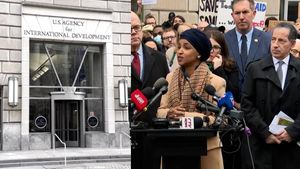The United States has announced the temporary suspension of tariffs on Mexican goods for one month, following discussions between US President Donald Trump and Mexican President Claudia Sheinbaum. This decision, taken just hours before the tariffs were set to take effect, signifies the urgency of negotiations aimed at addressing broader issues surrounding trade and security.
President Sheinbaum confirmed the suspension on social media, stating, "The tariffs will now be suspended for one month," reflecting the outcome of their recent conversation. She emphasized the respectful nature of the dialogue with Trump, noting, "We had a good conversation with President Trump, where we respected our relationship and sovereignty; we made several agreements." This collaboration aims to bolster border security and combat drug trafficking, particularly the flow of fentanyl from Mexico to the United States, which has reportedly caused significant harm within the US.
The threat of imposing tariffs—initially set at 25% on all Mexican imports—was part of Trump's strategy to leverage economic pressure on Mexico. The motivation behind the tariffs was twofold; primarily, Trump seeks to mitigate drug trafficking across the border and to continue pressuring Mexico to address illegal migration more actively. With Sheinbaum's commitment to deploy 10,000 members of the National Guard at the US-Mexico border, both leaders hope to tackle these pressing issues head-on.
Detailing the newly formed agreements, Sheinbaum added, "We will begin negotiations as planned on safety and trade issues this Monday." These discussions are expected to include not only security concerns but also efforts to regulate arms trafficking from the US to Mexico, which has been another significant point of tension. Trump echoed Sheinbaum's sentiments, stating, “I will participate in the negotiations intending to achieve results,” highlighting his active involvement.
The US-Mexico economic relationship is highly significant, with over 80% of Mexico's exports going to its northern neighbor. The threat of tariffs loomed large over thousands of businesses and millions of jobs reliant on this complex trade network, prompting fears of severe economic repercussions should the tariffs be enforced. This moment of negotiation allows both countries to navigate away from what could have been the start of an escalated trade war.
Aside from the direct impact on US-Mexico trade relations, the situation also reflects broader concerns surrounding Trump's trade policies. The initial tariff plans extended beyond Mexico to include Canada and China, exacerbated by fears of retaliatory tariffs. Canadian Prime Minister Justin Trudeau similarly announced on social media the suspension of anticipated tariffs after his own conversation with Trump, echoing Mexico's efforts to maintain economic stability amid swirling tariff threats.
The international finance community reacted immediately to the news of the tariff suspension as stock markets saw rallies following the announcement. The uncertainty related to Trump's trade strategy had previously stirred global market volatility, leading to significant losses and apprehensions about the future. Stocks for US automotive manufacturers climbed as optimism returned to markets buoyed by the news of cooperation from both Mexico and Canada.
With the suspension providing both time and space to develop effective agreements, the upcoming negotiations could redefine US-Mexico relations moving forward. The parties will aim for resolutions on not just the trade front but the migration and drug trafficking crises, all of which have long-standing societal repercussions.
Sheinbaum's firm stance on addressing drug smuggling by deploying enhanced military presence at the border indicates Mexico's determination to take significant action against drug cartels. The Mexican leader recently intensified measures against narcotics and brought forth substantial drug seizures, hoping to align with US goals under Trump’s administration.
Despite the apparent diplomatic progress, the Trump administration's trade policies are fraught with uncertainty. Many experts and economists are cautioning against the upsurge of tariffs, assessing their potential to hinder consumer purchasing power and drive inflation within the United States. They argue these factors could destabilize the country’s economy without achieving the desired effects on US foreign trade balances.
Experts are already warning of the ramifications if new tariffs are enacted, particularly with regard to Europe, which Trump has suggested could also be subject to his trade policies. Such statements may lead to heightened tensions among US allies, who fear being caught up in Trump's attempts to amend trade deficits.
Claudia Sheinbaum's government is still relatively new, providing them with some flexibility to navigate diplomatic waters without appearing too politically vulnerable. With the stakes high, the outcomes of the upcoming negotiations hold much promise. Both leaders appear to aim for constructive outcomes as they confront significant contemporary challenges.
The month-long suspension is but one step; achieving sustained cooperation amid the intricacies of international trade policies will be key. The results of the negotiations could yield valuable insights on future engagement between the US and its northern partners, impacting international relations and trade dynamics for years to come.
Speculation continues on what this means for the future, but for now, market optimism persists as both nations move toward discussions. It is clear from the growing number of commitments made by both parties, the initial tensions of trade may evolve, potentially paving the way for stable relationships going forward.



